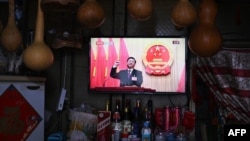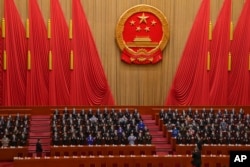Chinese President Xi Jinping’s latest move to bolster the power of the Communist Party and tighten its grip on society is a manifestation of the Communist ideology and will likely result in increased suppression at home and intensified conflicts with the West, according to analysts.
The annual national parliamentary session, which ended Monday, endorsed reforms that would boost the party’s control over state institutions.
The National People’s Congress on Friday approved a plan to reorganize central government institutions under the State Council, or Cabinet, including the formation of a financial regulatory body, a national data bureau and a revamp of its science and technology ministry. The party’s institutional reform plan was due out after the end of the parliamentary session Monday.
Since Xi came to power, he has headed two rounds of reforms - in 2013 and 2018 - setting up party groups to oversee policy changes in law and order, foreign affairs, finance and security.
Over the past 10 years, the Communist Party has moved from collective leadership with the general secretary, considered first among equals on the elite Politburo Standing Committee — a practice established in the “reform and opening” era after the Cultural Revolution — to Xi’s supreme leadership, analysts say.
In 2018, Chinese lawmakers amended the constitution abolishing presidential term limits - paving the way for Xi to rule for life. In a further move to assert his authority, the party pledged to uphold the "Two Establishes,” party-speak for loyalty to him, in a historical resolution passed in 2021.
Analysts say Xi’s reforms are the opposite of the “reform and opening” policy launched by paramount leader Deng Xiaoping in 1978, to diminish the party’s role in the government. They say Xi’s agenda would give major power to the party to set policy, while the State Council and its government ministries would merely see that the policies were implemented.
“Xi thinks he is the 21st century Mao. He feels so firm in his socialism faith and is the only one who could achieve so much,” said Willy Lam, senior fellow at the Washington-based Jamestown Foundation.
Chen Daoyin, a former associate professor at Shanghai University of Political Science and Law, says Xi’s preference for “jizhong liliang bandashi (concentrating on big things)” has its origin in Marxism-Leninism.
“It is the Communist Party’s nature to control. They only share power when they have no choice,” Chen said, adding that Lenin’s view of “party building” was that power should be firmly in the hands of the leaders.
Since Xi took power, he saw upholding the Communist Party’s one-party rule as his historical mission, having said in an internal speech in 2012 that when the Soviet Union collapsed, “Nobody was man enough to stand up and resist.”
“He is determined to become this man who ‘saves the party and the nation,’” Chen said. “Following this logic, he needs to grab power in the party, government, military, police and ideology to rejuvenate the country.”
And in the party’s eyes, the emergence of a civil society and business class is a threat to its rule, says Chen.
Chinese authorities have not only decimated China’s fledgling civil society in a series of crackdowns on human rights lawyers, liberal scholars, journalists, NGO workers and unofficial churches, but in recent years, they have also targeted technology companies such as Tencent and Alibaba and their bosses.
“People’s awareness of rights has awakened, and they want to get involved in public policymaking,” Chen said. “So, the party believes it must implement control, so they won’t demand power sharing anymore.”
Professor Chung Kim-wah, a social scientist formerly with the Hong Kong Polytechnic University, said Xi’s reversal of Deng’s reform agenda, his cult of personality and attacks on speech and civil freedoms, have alienated China from the international community.
“People had once hoped that economic reform would lead to changes… I should think nobody harbors this illusion anymore,” he said.
Lam believes China’s growing friction with the United States over trade and technology as well as Taiwan, the South China Sea and Ukraine issues, will mean that its economy will not rebound easily from the stagnation brought on by three years of a "zero COVID" policy.
“Xi won’t budge, so the problems will become more severe,” Lam said. “There is no way to bring about a reconciliation. The differences are too fundamental.”
Domestically, Xi’s consolidation of power will also augur more troubles ahead, analysts say.
In the absence of democratic elections, the Chinese Communist Party’s legitimacy depends on economic performance and nationalism, but with the economic slump and widespread discontent over the draconian COVID-19 restrictions, “the party’s legitimacy is wearing thin,” Lam said.
In late November, the stringent COVID measures sparked protests across China and escalated into a call for more freedoms. Elderly Chinese also protested in recent weeks against cuts to medical benefits. Although the unrest was quickly quashed, the frustrations are expected to grow. Xi’s consolidation of power could escalate suppression. Lam says authorities could increase social control and thwart potential unrest more effectively with the help of information gathered by the newly established data bureau.
Chung said Xi’s centralization of power would impact international politics and the economy.
“To a certain extent, I feel the Cold War has returned. This further consolidation [of] power makes the whole process harder to turn around. Would China take more military risks to defend itself?” Chung asked.
Li Shaomin, a professor at Old Dominion University in Virginia, said it is important to remember that the Chinese Communist Party has never abandoned one-party dictatorship.
“Now China has national strength, it feels it can implement absolute power. It can brandish its sword in front of the world,” Li told a VOA Chinese language current affairs program.
Chen warned the lack of checks on power means huge mistakes can be easily made, and given China’s connection with the world, the consequences could have a tremendous impact. He cited the example of how the authorities’ suppression of news of the emergence of COVID three years ago led to its rapid spread around the world.
“This could lead to a disaster, and this is the dreadful thing about the concentration of power,” Chen said.





